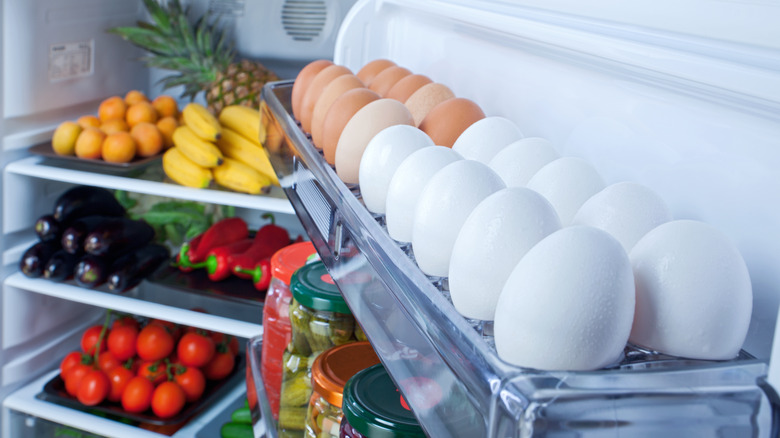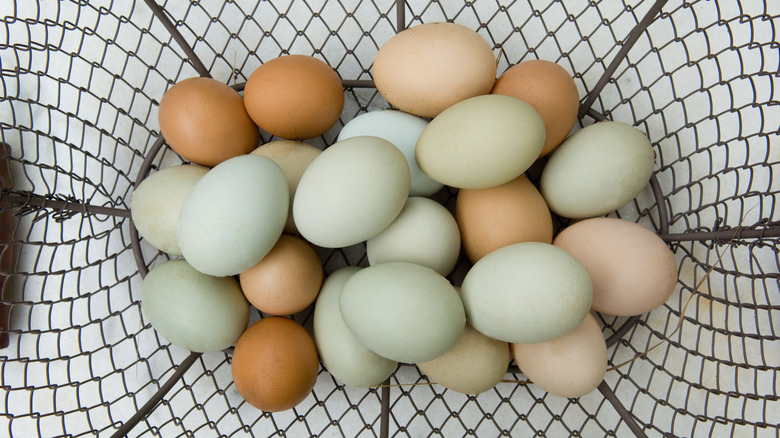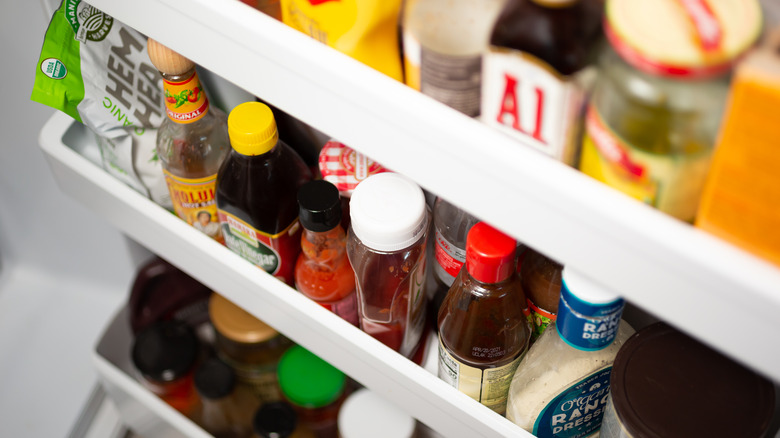Avoid This Risky Mistake With The Eggs In Your Refrigerator
If you've ever handled raw eggs or raw chicken, you've probably heard warnings about salmonella and how dangerous it can be. Much of the cooking content you'll find on TV or online will consistently stress the importance of kitchen safety when handling raw chicken and raw eggs, but what about how eggs are stored? You might open your fridge and notice there is an egg-holding compartment in the door. You might be tickled by how cute and convenient that is, but whatever you do, don't use it.
Eggs cannot remain at a safe temperature if they're stored in your refrigerator door. Instead, they need to be stored in the coldest area of your fridge, which in many cases is the back of one of the lower shelves.
The only circumstance where you should store eggs in the door is if you're keeping them there for a short time before cooking them. If you're planning to hard boil an entire dozen eggs in a few minutes, you could leave them in the door, but why not just keep them in their carton instead, in a cold and safe area? Why is temperature so important when storing eggs? Well, it has to do with how eggs are treated before sale.
Why temperature matters
If you've spent any time outside of the U.S., say in Europe, then you might be scratching your head wondering what all the fuss is about. After all, in many European households, you'll find a basket of fresh eggs stored on the counter.
USDA standards in the United States require farmers to wash, sanitize, and refrigerate all eggs before they're shipped and sold, which means you need to keep them cold at home. While it's not uncommon to see these baskets or bowls of fresh eggs sitting on countertops in Europe, Americans are discouraged from acting in similar ways due to safety concerns.
European farmers are not required to wash and sanitize their eggs, which means that the outer protective coating on the egg remains intact and the eggs are less likely to develop salmonella contamination. The American practice of washing and sanitizing eggs before selling them, however, removes this protective coating, rendering the eggs more vulnerable.
If eggs warm up and produce condensation on the shell, bacteria can then permeate the shell, which is porous. Salmonella thrives in temperatures of 40 to 140 degrees Fahrenheit, which means if you're opening your fridge consistently throughout the day, the products in the door will be exposed to warmer temps. The safest place to store eggs remains the back of a bottom shelf of the fridge, where temperatures will remain coldest.
Fill your fridge door with these items instead
If your refrigerator door comes with an egg storage area, you may want to remove it to create more storage space for items that can be safely stored in the door. Many refrigerators have shelves and compartments that can be moved and removed so it shouldn't be too hard to remove an egg storage container or shelf from the fridge.
If you're in the market for a new refrigerator, be sure to check the door compartment design to make sure you can utilize it properly and safely. Egg storage areas might look cute, but they just aren't safe.
Use the door of your refrigerator to store things that are more resistant to fluctuating temperatures: sauces, condiments, jars and cans that are shelf stable and have yet to be opened. If you absolutely cannot remove an egg storage area from your fridge, consider thinking outside the box. Those little round divots are a good place to store wrapped fun-size candies, or even ketchup or soy sauce packets that you might have left over from take-out nights.
Thinking you can just store hard-boiled eggs in the refrigerator door? Think again. Hard-boiled eggs should be stored in an airtight container or bag in the middle of the fridge, even if they've yet to be peeled. Keep your eggs cold and safe; keep your salad dressings in the door instead.



